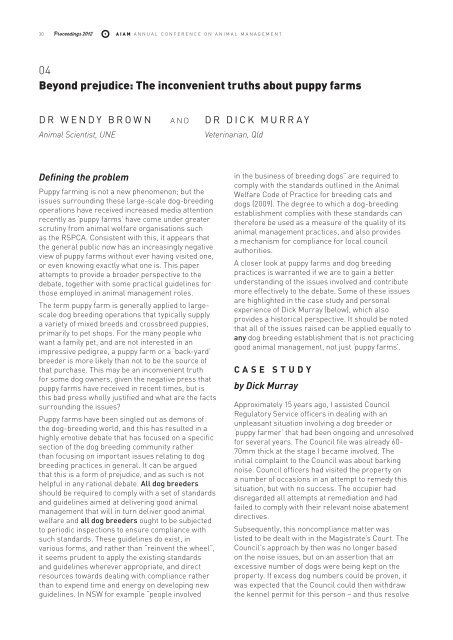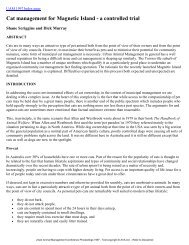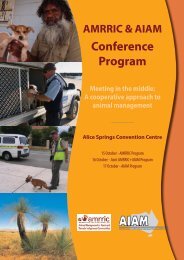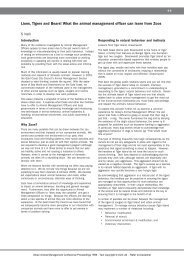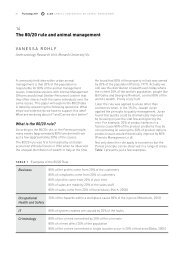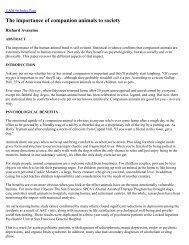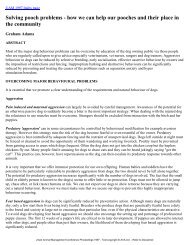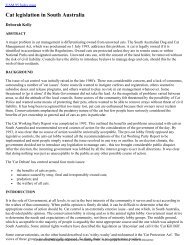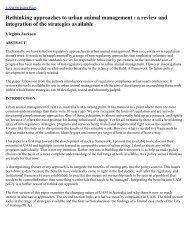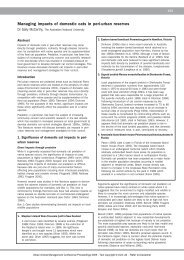Proceedings OF ThE - Australian Institute of Animal Management Inc
Proceedings OF ThE - Australian Institute of Animal Management Inc
Proceedings OF ThE - Australian Institute of Animal Management Inc
Create successful ePaper yourself
Turn your PDF publications into a flip-book with our unique Google optimized e-Paper software.
30 <strong>Proceedings</strong> 2012<br />
AIAM Annual Conference on <strong>Animal</strong> <strong>Management</strong><br />
04<br />
Beyond prejudice: The inconvenient truths about puppy farms<br />
Dr Wendy Brown and Dr Dick Murray<br />
<strong>Animal</strong> Scientist, UNE<br />
Veterinarian, Qld<br />
Defining the problem<br />
Puppy farming is not a new phenomenon; but the<br />
issues surrounding these large-scale dog-breeding<br />
operations have received increased media attention<br />
recently as ‘puppy farms’ have come under greater<br />
scrutiny from animal welfare organisations such<br />
as the RSPCA. Consistent with this, it appears that<br />
the general public now has an increasingly negative<br />
view <strong>of</strong> puppy farms without ever having visited one,<br />
or even knowing exactly what one is. This paper<br />
attempts to provide a broader perspective to the<br />
debate, together with some practical guidelines for<br />
those employed in animal management roles.<br />
The term puppy farm is generally applied to largescale<br />
dog breeding operations that typically supply<br />
a variety <strong>of</strong> mixed breeds and crossbreed puppies,<br />
primarily to pet shops. For the many people who<br />
want a family pet, and are not interested in an<br />
impressive pedigree, a puppy farm or a ‘back-yard’<br />
breeder is more likely than not to be the source <strong>of</strong><br />
that purchase. This may be an inconvenient truth<br />
for some dog owners, given the negative press that<br />
puppy farms have received in recent times, but is<br />
this bad press wholly justified and what are the facts<br />
surrounding the issues?<br />
Puppy farms have been singled out as demons <strong>of</strong><br />
the dog-breeding world, and this has resulted in a<br />
highly emotive debate that has focused on a specific<br />
section <strong>of</strong> the dog breeding community rather<br />
than focusing on important issues relating to dog<br />
breeding practices in general. It can be argued<br />
that this is a form <strong>of</strong> prejudice, and as such is not<br />
helpful in any rational debate. All dog breeders<br />
should be required to comply with a set <strong>of</strong> standards<br />
and guidelines aimed at delivering good animal<br />
management that will in turn deliver good animal<br />
welfare and all dog breeders ought to be subjected<br />
to periodic inspections to ensure compliance with<br />
such standards. These guidelines do exist, in<br />
various forms, and rather than “reinvent the wheel”,<br />
it seems prudent to apply the existing standards<br />
and guidelines wherever appropriate, and direct<br />
resources towards dealing with compliance rather<br />
than to expend time and energy on developing new<br />
guidelines. In NSW for example “people involved<br />
in the business <strong>of</strong> breeding dogs” are required to<br />
comply with the standards outlined in the <strong>Animal</strong><br />
Welfare Code <strong>of</strong> Practice for breeding cats and<br />
dogs (2009). The degree to which a dog-breeding<br />
establishment complies with these standards can<br />
therefore be used as a measure <strong>of</strong> the quality <strong>of</strong> its<br />
animal management practices, and also provides<br />
a mechanism for compliance for local council<br />
authorities.<br />
A closer look at puppy farms and dog breeding<br />
practices is warranted if we are to gain a better<br />
understanding <strong>of</strong> the issues involved and contribute<br />
more effectively to the debate. Some <strong>of</strong> these issues<br />
are highlighted in the case study and personal<br />
experience <strong>of</strong> Dick Murray (below), which also<br />
provides a historical perspective. It should be noted<br />
that all <strong>of</strong> the issues raised can be applied equally to<br />
any dog breeding establishment that is not practicing<br />
good animal management, not just ‘puppy farms’.<br />
Case stUDY<br />
by Dick Murray<br />
Approximately 15 years ago, I assisted Council<br />
Regulatory Service <strong>of</strong>ficers in dealing with an<br />
unpleasant situation involving a dog breeder or<br />
‘puppy farmer’ that had been ongoing and unresolved<br />
for several years. The Council file was already 60-<br />
70mm thick at the stage I became involved. The<br />
initial complaint to the Council was about barking<br />
noise. Council <strong>of</strong>ficers had visited the property on<br />
a number <strong>of</strong> occasions in an attempt to remedy this<br />
situation, but with no success. The occupier had<br />
disregarded all attempts at remediation and had<br />
failed to comply with their relevant noise abatement<br />
directives.<br />
Subsequently, this noncompliance matter was<br />
listed to be dealt with in the Magistrate’s Court. The<br />
Council’s approach by then was no longer based<br />
on the noise issues, but on an assertion that an<br />
excessive number <strong>of</strong> dogs were being kept on the<br />
property. If excess dog numbers could be proven, it<br />
was expected that the Council could then withdraw<br />
the kennel permit for this person – and thus resolve


